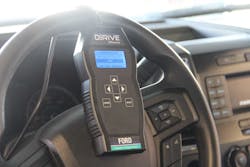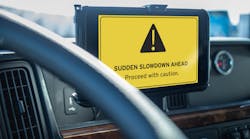Content provided by Derive Efficiency
Any law enforcement fleet manager knows: getting buy-in for adoption of new technology can be one of the most difficult tasks a fleet manager faces.
Idle efficiency technology providers like engine calibration software maker Derive Efficiency contend that they can offer a quick, affordable and custom-tailored way to save on fuel costs, extend vehicle life, reduce emissions and maintain a high level of performance and readiness. What are the advantages of achieving efficiency through software-enabled engine calibration? Fleet managers point to several benefits.
1) Low Initial Cost
Oftentimes, budgetary constraints pose a barrier to adopting technology. An investment in new technology be a tough sell when many municipalities are making efforts to trim the costs of simply maintaining the status quo. Furthermore, while some investments pay for themselves within a short period, many green upgrades require a significant investment before a fleet sees any result.
Engine calibration technology significantly lowers this hurdle. With lower upfront costs than other efficiency solutions, tuning engines to match fleet needs enables fleet managers to see a positive return on investment relatively quickly.
The City of Lakeland, FL had immediate results in mind when they approached Derive about lowering fuel consumption by reducing idle RPM in both their police fleet and other municipal vehicles. Since police vehicles idle six to eight hours per day, Derive’s calibration had the potential to make an instant impact on the city’s bottom line.
Lakeland fleet manager Gary McLean says that Derive delivered on that potential. The fleet quickly realized a 26% savings in idle fuel consumption. In fact, Derive technology helps save the City of Lakeland 30,000 gallons of fuel annually — the equivalent to removing 56 passenger vehicles from the road.
“The low cost and the quick application is a big payoff,” McLean says. “Some of the other technologies out there are extremely intrusive and they are costly. We chose to do things that have an immediate impact at a low cost, and Derive has provided just that.”
2) Quick, Easy Installation
Even if the technology itself will payoff, the savings may not be worth the effort if installation means excessive downtime of a fleet’s vehicles. Time spent in the shop getting bolt-on upgrades and other improvements not only affects a police fleet’s readiness, but it also eats up even more man-hours in installation.
A study by Element Fleet Management found that vehicle downtime can cost a fleet between $448 and $760 a day. For police fleets in particular, this is compounded by a dip in precinct coverage and public presence.
By approaching fuel efficiency from a software standpoint, Derive reduces vehicle downtime significantly. Its engine calibration software can be uploaded to a vehicle’s engine control module through the OBD-II port in less than 15 minutes, using Derive’s handheld programmer, meaning vehicles won’t be off the road for long. An entire fleet of law enforcement vehicles can be upgraded and back on the road in a matter of hours. Moreover, software means no added weight and very little need for maintenance.
When a police fleet manager opts for hardware add-ons or new green vehicles, the solutions start heading toward obsolescence the second they leave the factory. To the contrary, software-enabled engine calibration allows law enforcement fleet managers to keep their vehicles running on the latest technology without costly upfitting or taking vehicles off the road for an extended period of time.
3) Guaranteed Savings in Idle
Law enforcement vehicles at factory settings are set at an idle RPM level that exceeds the needs of most police fleets – a costly excess when a typical patrol car idles 6 to 8 hours each day. Most “on/off” idle efficiency solutions involve turning off the engine to save fuel. An idle reduction engine calibration, however, simply turns down a vehicle’s engine RPM during idle periods. Turning the engine’s idle RPM down just 12% reduces fuel burn during the idling hours, without sacrificing the power needed to run electronic equipment or effecting the vehicle’s readiness to spring into action.
By using software to adjust key parameters that create a lower idle RPM – instead of relying on auxiliary batteries – Derive engine calibration software offers fuel savings without any space or weight footprint.
These savings have proven to be so reliable that Derive guarantees a 6% reduction in fuel consumption to fleets who deploy Derive’s idle reduction software. Most fleets have seen even greater reductions in fuel consumption.
“As a result of Derive Efficiency programming, we have seen an increase in our fuel mileage, and in some cases, as much as three miles per gallon,” says Longwood, Fla. Police Chief Tom Jackson. “Derive was very effective in enhancing the fuel efficiency of my agency’s patrol cars without affecting their performance.”
4) Tailored Solution
To make sure police vehicles are ready for any challenges officers might encounter in the line of duty, manufacturers send PPVs off the assembly line with features and specs designed to provide all the pep, power and durability they could possibly need. But all that potential isn’t needed every hour of every day on the streets. Police fleets can earn significant savings by customizing engine performance to match the way their officers use their vehicles on a day-to-day basis.
By adjusting key parameters like idle RPM, shift pattern optimization, torque management and cylinder deactivation, fleets can conserve fuel, reduce emissions and still maintain the high level of readiness that’s required in an unpredictable law enforcement landscape. Every police fleet has different requirements, and Derive creates solutions tailored to specific usage needs. This flexible approach to fuel efficiency allows fleets to work closely with Derive to customize the solution to fit their specific needs and address their fuel savings goals.
Law enforcement fleet managers like Bob May with Florida’s Port St. Lucie department have reported consistent gains in fuel consumption and the ability to more effectively perform on a day-to-day basis. After implementing Derive software, Port St. Lucie saw an almost 12% reduction in idle consumption and more than 11% overall savings on fuel, as well as 200 fewer pounds of emissions per month per car.
Derive software works with most Ford, GM and Lincoln vehicles, including Tahoe, Taurus, Explorer, Crown Vic, F-150 and many other models popular with law enforcement.
To find out more about Derive idle efficiency and engine calibration technologies can meet the unique demands of each police fleet, visit http://derivesystems.com/efficiency.



